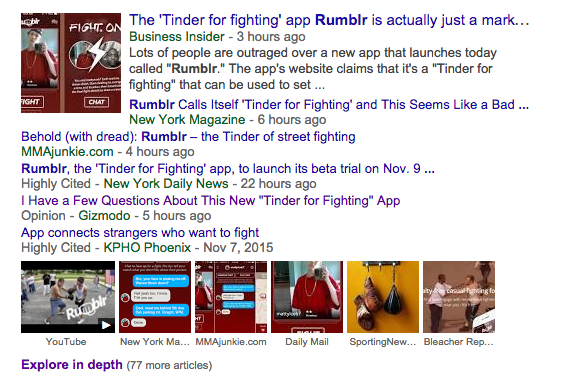Reflecting on Rumblr: The 4 phases of the Internet falling for a hoax

It had all the makings for the perfect viral story: The “Tinder for [insert ridiculous noun]” pitch, a premise that sounds believable in this current state of app-phoria, a perfectly manufactured startupland name, a sleek website and a slow Monday morning news cycle.
Yesterday much of the online media was duped into writing about Rumblr, an app that described itself as the place “for recreational fighters to find, meet and fight other brawl enthusiasts nearby.” There was even a mock-up of the app and a promise that it was “coming soon” to the Apple Store.
It was all a hoax. From the beginning, the idea was filled with holes including screenshots of a non-existent Instagram account. an illegal premise that Apple would never approve, a lack of Terms of Service that’s standard on apps, a non-working number on its WhoIs domain database and cheap looking mock-ups (please, everyone with a phone knows that Verizon isn’t written in all caps.)
Let’s reflect on the four phases of falling for it:
Phase 1: Falling for the pitch.
Rumblr’s first victim was VentureBeat, which wrote about it on Friday without an ounce of skepticism.
“No sign of any monetization efforts on the site, just an effort to build a large community of punchers,” it dutifully notes. “But, you know, Rumblr might be a good site for advertisements from emergency rooms, anger management therapists, or first-aid supplies.”
From there, the story was rehashed and re-written nearly dozens and dozens of times according to a search on Google News:

The usual viral content factories fell for it, including the U.K.’s Independent, Metro, Digital Spy, Complex, MMA Junkie, Vice Sports, irrelevant local television websites (KPHO-TV in Phoenix even interviewed a police officer about it!) and lots of others. The New York Daily News even conducted the interview with the “founders” who said it has “raised substantial funding from private American investors.” (They also told the paper it operates out of a “shared space in SoHo,” which only adds to the believability, to be honest.)
Besides Vice Sports and MMA Junkie, the websites listed above haven’t updated the story to reflect that it’s a hoax.
Phase 2: Wait a minute, maybe this is fake?
Of course, there were other websites that were, at the very least, a little uneasy about the whole idea, most notably Gizmodo. In addition to framing the story in the form of a question (“I Have a Few Questions About This New ‘Tinder for Fighting’ App”), the post’s author said that “clearly, somebody is trolling us,” adding this “whole set up screams viral marketing campaign” before debating the legality of a presumed marketing hoax.
The Washington Post also had a similar take, declaring “there’s no way that the app is real” and hedged that Rumblr is a “marketing stunt, a prank or (best case!) an unsubtle parody.” Well, one of those definitely had to be correct eventually.
Phase 3: The truth is revealed.
Business Insider said it spoke to “someone in the New York startup scene” (someone! literally anyone!) confirming the fact that yes, Rumblr it was fake and that someone was “secretly amazed that people had fallen for the stunt.”
At around 5:15 p.m., roughly 72 hours after the first story was written and 15 minutes after the app was supposed to go live, the founders finally came clean, revealing that we’re all dummies. In a pop-up page on its website, founders admitted it was a rouge to launch their new creative firm.

Phase 4: Cue the think pieces.
Now entering its final phase this morning, think pieces sprung up everywhere — even right here (how meta!). Vice expectedly delivered, writing “I Tried and Failed to Fight Someone on ‘Tinder for Fights,’ Because It Was Fake,” while The Daily Beast was more remorseful with the headline “I Helped Promote a Fake Fighting App.”
Perhaps it was Uproxx that said it best, saying the “lesson here of course is not to believe everything (or anything) you read on the Internet.” Especially when it’s as stupid as this.
More in Media

Media Briefing: Publishers who bet on events and franchises this year are reaping the rewards
Tentpole events and franchises are helping publishers lock in advertising revenue.

With Firefly Image 3, Adobe aims to integrate more AI tools for various apps
New tools let people make images in seconds, create image backgrounds, replacing parts of an image and use reference images to create with AI.

Publishers revamp their newsletter offerings to engage audiences amid threat of AI and declining referral traffic
Publishers like Axios, Eater, the Guardian, theSkimm and Snopes are either growing or revamping their newsletter offerings to engage audiences as a wave of generative AI advancements increases the need for original content and referral traffic declines push publishers to find alternative ways to reach readers.





